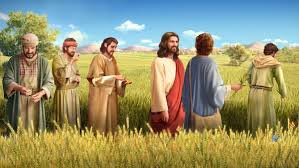HOMILY WEEK 22 06 – Year II
Servants of Christ and Stewards of God’s Mysteries
(1 Cor 4:6-15; Ps 145; Lk 6:1-5)
************************************************
“Think of us as servants of Christ and stewards of God’s mysteries.”
That line, from St. Paul in his letter to the Corinthians, provides us with a strong message and mandate: we are to be servants of Jesus Christ and stewards of the mysteries of God’s grace.
We know, from his other writings and teaching, that for St. Paul, nothing is more important than Jesus Christ crucified. His encounter with Jesus on the road to Damascus changed his life, marked him forever, and transformed him into the world’s greatest evangelizer. As he puts it, in Christ Jesus he became the father of all who believe in the gospel.
 In the gospel, we see Jesus and his disciples breaking the Sabbath law by plucking and eating corn on the Sabbath. When questioned by the Pharisees, who try to observe the law to the letter, Jesus used that incident to assert his divinity. As the Son of Man, he is the Incarnate One, the Word made flesh, totally human. As the Son of God, he is divine, sharing the Father’s power and authority, and Lord of the Sabbath.
In the gospel, we see Jesus and his disciples breaking the Sabbath law by plucking and eating corn on the Sabbath. When questioned by the Pharisees, who try to observe the law to the letter, Jesus used that incident to assert his divinity. As the Son of Man, he is the Incarnate One, the Word made flesh, totally human. As the Son of God, he is divine, sharing the Father’s power and authority, and Lord of the Sabbath.
To communicate that radical new revelation to the Pharisees, Jesus cleverly refers to the actions of King David who when hungry, overcame the temple priests’ objections and ate the bread of the Presence with his men, tantamount to blasphemy in the eyes of the Pharisees. Why would Jesus bring that incident up? It is because of all the kings of Israel, David came closest to incarnating in himself that energy and authority of God. David sinned grievously, but he repented wholeheartedly, and experienced God’s compassion and unconditional love as pure forgiveness. That experience transformed David in the best king Israel ever had.
What David did was act out of his assurance as one chosen and transformed by God’s love. He knew God had made him king, and he was imbued with that intimate experience of God’s love, so he could tell the priests, “I am king of Israel, representing God here on earth, and if God was here right now in this situation, that is what God would do.” He was exercising his kingship according to the will of God and that gave him the security to transcend the Sabbath rules, as did Jesus.
Jesus, who in other passages would say, “You have heard it said, but I say to you …” was putting himself above the Torah, the ultimate authority for the Jewish religious leadership. Here, he does so as the Son of Man, asserting that the person they see before them is the Messiah, the Word made flesh, and Lord of the Sabbath.
This resistance to the divinity of Jesus and to the mysteries of God is very much present and manifests itself in a variety of ways to this day. There are some who struggle with the idea of God in the program of Alcoholics’ Anonymous, trying to change it into Rational Recovery or Beyond Belief, and changing the closing traditional “Our Father” to a more neutral prayer. Others are trying to change Christmas into a secular holiday, prompting the Knights of Columbus to run a campaign to “Keep Christ in Christmas.” When we were conducting the much beloved Christopher Leadership Course, a Christian course on effective speaking and leadership, some objected to the Prayer of St. Francis and spiritual talks.
The Eucharist is our Bread of Presence, the Body and Blood of Jesus, far transcending what was in the Holy of Holies. May our celebration deepen our faith in God’s love for us and empower us to be servants of Christ and stewards of the mysteries of God.



